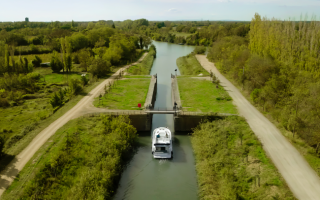A manoir for all seasons
Deep in the Oxfordshire countryside, a little piece of France is celebrating its 25th birthday. Rachel Scott visits Le Manoir aux Quat’ Saisons to discover how Raymond Blanc’s French values helped to make a fairytale come true…
Sitting down to breakfast with Raymond Blanc is something of an education. We are in L’Orangerie, the largest of the three restaurant rooms at Le Manoir aux Quat’ Saisons, Blanc’s famous hotel in Oxfordshire. The sun streams through the windows and views of the idyllic white, blue and green gardens are spectacular. Spread before us is a choice array of fruits, cheese and breads, part of a breakfast menu it took Blanc a year to create. Soft classical music can be heard and the service is all quiet attention. The Frenchman can appreciate this scene, after all, he has orchestrated the whole thing. Yet he can also see more; constantly vigilant, he spots that the music is ever so slightly too loud, and that sauces are being served in the wrong container. Small points perhaps, but it is this sort of attention to detail that helps to explain why a selftaught chef from the rural heart of Franche-Comt� has managed to stay at the top of the competitive hospitality industry for so long and continues to improve what, to an outsider, seems like a nigh-on perfect experience for guests.Raising the barIt’s been 25 years since a youthful Blanc opened Le Manoir, the country house hotel which raised the bar for institutions of its kind. He never meant to take on such an ambitious endeavour; he was busy with his two Michelinstarred restaurant, Les Quat’ Saisons, in Oxford and was looking for something small.“I wanted a small house which I could call home sweet home, a little English cottage, not a bourgeois house, something very friendly with two or three bedrooms, a large garden, tables for my friends to have a drink. But that is not what happened. They say if you want to make God laugh, tell him your plans.”After three years of searching for the next step, he was flicking through Country Life magazine one day and fell in love. “I saw the front gate of a house and something happened, and I took my battered little car and immediately went to see that house. When I stopped there at the gate – phew! I fell in love with it. It was as strong as that and it changed my life completely.”He says it was the “mini grand drive” that he first fell for. “Then I fell in love with the different levels of gardens, with the lovely old walls separating them, I fell in love with the yellow stone, I fell in love with the whole thing. I was entering a fairytale… when I saw it I just thought – that’s it.”When Blanc discovered the 15th-century manor house, Britain was in recession and turning it into a restaurant and hotel was a brave plan. “It was a vision, a complete vision. We had to borrow tons of money and create a company. For a young man it was crazy. No money had been invested for many years.”Turning the dream into reality took not only money, but all of Blanc’s energy; cooking, planning, meeting workmen, creating menus and building a reputation, work that the seemingly tireless Blanc carries on to this day.“It’s exhausting, the creative process. Today I am multitasking all the time. I jump in the kitchen, then jump in the garden.”Ask him why Le Manoir has become such a success and Blanc says that it is because of decisions he took very early on – instinctive decisions that are as relevant today as they were 25 years ago. The son of an “ardent Communist and a guilty Catholic”, Blanc says he brought his French values to the UK; welcoming children to Le Manoir and seeing pleasure as a form of inclusive luxury.“I am French Republican. I will certainly never be an English gentleman, that is too boring!“I want people to come here and celebrate a special occasion, a special moment in their lives.”And Blanc is in his element with these people, a natural host, brimming with bonhomie. On our tour around the grounds he is constantly stopping to greet guests, friendly and approachable, asking them how they are enjoying themselves and sharing a joke. He clearly cares about every one of them.“Little by little it has become known that Le Manoir is not a French nosebag but a place of true celebration, a true welcome, where we look after the little people as well. It’s about a culture, maybe it’s the socialist values of my father but maybe they are humanitarian values. I want to create a place that is truly alive, alive through the act of giving, the act of sharing. I know it’s a clich�, but we’ve succeeded.”He’s right, a quarter of a century on, this working class boy, who came to England as a waiter at the age of 21 with no formal culinary qualifications, has trained 25 Michelin-starred chefs, and Le Manoir has held the coveted two Michelin stars for 25 years. Just under 200 people now work at Le Manoir and it is a multi-million-pound business with a successful cookery school. At least 85 per cent of his managers have worked with Blanc for more than 10 years. Watching them at work, they obviously take as much pride in Le Manoir as he does, and they clearly love him, greeting him with pleasure, everywhere we go. This lends Le Manoir a unique atmosphere, not just of excellence, but of genuine warmth. Blanc speaks of this with pride: “The Manoir is a place where there is a true culture, not just of food, but of teaching, training, empowering young people, making them strong, not just great craftsmen but also managers, giving back respectability to our industry.”Micro managingIt says a lot about Blanc’s background and his French values that the gardens of Le Manoir are so important to him. Growing up near Besan�on he spent many years working in the garden of his family’s home, growing the produce which Maman Blanc would use to cook meals or store for the winter. Seasonality is today a cornerstone of his philosophy and creating a vegetable garden for the restaurant was his first priority.“The lawn was perfect but the potager was a disaster, so my father came to help me prepare the ground. It took him six months to cultivate it and get rid of the jungle and plant the first seeds. One of my greatest joys was actually to see this tiny seedling pushing through the ground.”Today the potager at the Manoir grows a lot of the produce used in the kitchens, and Blanc, as passionate as ever about food that isn’t intensively farmed, has plans to grow even more in a seven acre organic farm currently in the planning stages. A Japanese water garden and wild mushroom valley can also be found in the grounds along with a herb garden. Walking with me through the more formal gardens Blanc takes pleasure in his surroundings, but also notices pink delphiniums growing alongside the purple and says that they will be taken out. Again, the attention to detail in every aspect of Le Manoir, which he says is natural.Micro-idiot“It was one of the greatest moments of my life to see the kitchen I designed made so beautiful. I’m not talking about ownership. It was mine aesthetically, emotionally, intellectually, mine as part of my life, not separate from it. So of course I’m involved in every bit of it, in every detail, even down to the flowers.“I am totally obsessed by the detail, I am a micro-idiot, whether it is in the garden, or the entrance.”This attention to detail extends to the guest suites at Le Manoir, which are designed around Blanc’s travels; the people he’s met along the way and the objets d’art he’s collected. Stay in the Snow Queen room and enjoy the sillklined walls, giant crystals and early edition of a Hans Christian Andersen book. Visit the Opium suite and see an original sculpture from the Ming dynasty, sit in a private garden and listen to your personal water feature.“I would never let a designer come into my space and design because you would end up with designed rooms with no feeling. Here you feel something special; someone has used a loving hand to create that experience.”With plans for the organic farm, an 8,000-tree orchard and a spa in the grounds, Blanc says he is preparing for the future. “My role is to make Le Manoir continue beyond me. It’s not about leaving a mark behind me, it’s for the place itself. When I leave this place, I want it to be sustainable.”Although he is not planning to leave just yet, he says he can see a time when he will retire.“Because I love life, there’s so much more to discover. I want to become a travel writer, I want to see different parts of the world. I miss my family.”In Le Manoir, Blanc has created a quite remarkable standard of food and service. But perhaps his ethos is best summed up in this story he tells of the early days of Le Manoir.“It was about the second day we’d opened and these young people had heard about it and they came in a battered Mini at the front gate. I always remember, I was at the entrance and I saw this Mini and I saw these young kids looking at the house.“There was a Rolls Royce outside with a chauffeur and I could see them completely scared to death. I ran to them. They were about to turn around and I said: Come in, it’s OK, you will have a wonderful time’.“And then we took them in our hands and we gave them the best time they’d ever had and they came back, year after year.” This is the sort of detail that Raymond Blanc is never likely to forget.
Share to: Facebook Twitter LinkedIn Email


